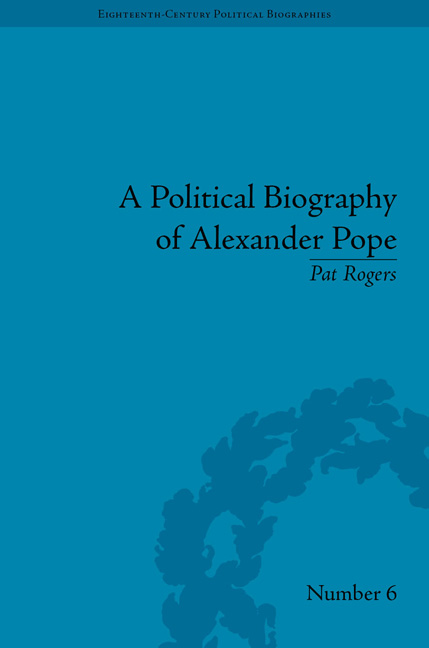Book contents
- Frontmatter
- CONTENTS
- Dedication
- Acknowledgements
- Abbreviations
- Dates and Quotations
- Sources
- Introduction
- Part I William and Anne, 1688–1714
- Part II George I, 1714–27
- 4 Civil and Religious Rage
- 5 Toil, Trouble, South Sea Bubble
- 6 A Dull Duty and a Public Cause
- Part III George II, 1727–44
- Epilogue: After Walpole
- Notes
- Works Cited
- Index
5 - Toil, Trouble, South Sea Bubble
from Part II - George I, 1714–27
- Frontmatter
- CONTENTS
- Dedication
- Acknowledgements
- Abbreviations
- Dates and Quotations
- Sources
- Introduction
- Part I William and Anne, 1688–1714
- Part II George I, 1714–27
- 4 Civil and Religious Rage
- 5 Toil, Trouble, South Sea Bubble
- 6 A Dull Duty and a Public Cause
- Part III George II, 1727–44
- Epilogue: After Walpole
- Notes
- Works Cited
- Index
Summary
As things turned out, 1717 would mark an important stage in Pope's private life and in his literary career. For the next two years he consolidated his position in the world of letters and prepared for the move to Twickenham, by which he finally signalized his independence at the age of thirty. A necessary but not sufficient condition before he could take this step was to achieve financial stability by means of the Iliad. Here he benefitted not just from the subscriptions, but also from a deal he had made with Bernard Lintot over the proceeds of a trade edition for the general public.
1
By this time he had made friends at court. That is a misleading statement, for his contacts nearly all lay in what increasingly became an alternative court headed by the Prince and Princess of Wales. Pope enjoyed lightly flirtatious relations with some of the maids of honour to the Princess, and wrote a number of verses satirizing their foibles. Once, in September 1717, he sent the Blount sisters an amusing account of a day spent with these women. He went by water to Hampton Court (again his life seems to have been prefigured by Belinda's story in The Rape of the Lock) and commiserated with his hosts on their miserable existence:
I met the Prince with all his Ladies … on horseback coming from hunting. Mrs Bellendine and Mrs Lepell took me into protection (contrary to the Laws against harbouring Papists), and gave me a Dinner, with something I liked better, an opportunity of conversation with Mrs Howard.
(Corr., vol. 1, p. 427)Here we encounter two names significant for the poet's later biography: Mary ‘Moll’ Lepell, who three years afterwards married the courtier John Hervey, immortalized by Pope as ‘Sporus’, and Henrietta Howard, mistress to George II and a key contact for politicians of all stripes.
- Type
- Chapter
- Information
- A Political Biography of Alexander Pope , pp. 103 - 122Publisher: Pickering & ChattoFirst published in: 2014



